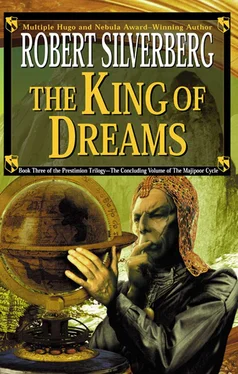In theory, Teotas thought, he himself would feel no great impact from any of that. He was the youngest of the four princely Muldemar brothers, with no hereditary obligations, free to live out his life as he pleased. Prestimion, the eldest, had always been destiny’s darling, rising swiftly and inevitably to the throne of the world. Taradath, the brilliant second brother, had perished in the Korsibar war. To sturdy Abrigant, the third, the family fief at Muldemar had descended, and he lived there now at Muldemar House, as princes of Muldemar had for centuries, presiding over the winemakers and dispensing justice to his adoring citizens.
Teotas, though, had lived the life of a private citizen until Prestimion had chosen him for the Council. He had taken to himself a wife, the excellent Lady Fiorinda of Stee, a childhood friend of Prestimion’s wife Varaile, and together they had reared three admirable children; and when Prestimion named him to the Council, he made himself one of its most useful members. All in all, he had created a satisfying life for himself, though there was that unhappy quirk in his character that prevented him from taking full pleasure even in the utter fulfillment of all ambition and desire.
And now—now—
The to-ing and fro-ing of these coronation ceremonies was finally coming to an end. Soon everyone would have settled down in his proper place. For Prestimion and Varaile, that place would be the Labyrinth. And Varaile wanted Fiorinda—her sister-in-law and chief lady-in-waiting—to live there with her.
Did Varaile understand that that would mean, for Fiorinda, the uprooting of her entire family? Of course she did. But the two women were inseparable friends. It must seem to Fiorinda and to Varaile as well that it was better for Fiorinda and her family to move to the subterranean capital in the south than for them to be parted from one another.
Teotas, though, had lived at the Castle since he was a boy. He knew no other home, except only the family estate at Muldemar House, and that was Abrigant’s property now. The Castle’s thousands of rooms were like extensions of his own skin. He roved far and wide through the meadowlands outside, he hunted in the forest preserves of Halanx, he enjoyed the giddy pleasures of the juggernauts and mirror-slides of High
Morpin, he wandered now and again down to Muldemar to reminisce about old times with Abrigant. As his sons grew toward manhood he took them with him in his wanderings among the cities of the Mount, bringing them to see the stone birds of Furible in their mating flight, and the lovely burnt-orange towers of Bombifale, and the festival of the flaming canals of Hoikmar. Castle Mount was his life. The Labyrinth held no appeal for him. That was no secret to anyone.
He had always indulged Fiorinda in every whim. This was more than a whim; but he would, if he could, indulge her in this too. But this one was very hard.
There was a final twist in the situation that made his yielding well-nigh impossible. Dekkeret, upon returning from Prestimion’s coronation, had asked him to serve him as High Counsellor of the Realm. “It will provide continuity,” Dekkeret had said. “Prestimion’s own brother, taking the second highest post at the Castle, and who else is better qualified than you, a key member of Prestimion’s own Council—?”
Yes, it made sense. Teotas was honored and flattered.
But was Dekkeret aware that Varaile had already summoned Fiorinda to be her companion at the Labyrinth? Apparently he was not. And the two appointments were irreconcilable.
How could he be Lord Dekkeret’s High Counsellor at the Castle while Fiorinda was the Lady Varaile’s chief lady-in-waiting at the Labyrinth? Were Dekkeret and Varaile expecting them simply to rip their marriage apart? Or were they supposed to divide their time, half the year at one capital and half at the other? That was plainly unworkable. The Coronal needed his High Counsellor at his side all the time, not off for months communing with the Pontifex in the Labyrinth. Varaile would not want to be parted that long from Fiorinda, either.
One of them would have to make a great sacrifice. But which one?
Thus far Teotas had shied away from discussing the matter with Fiorinda, hoping forlornly that some easy miraculous solution would present itself. He knew how unlikely that was. It was ever his inclination to yield to her wishes, yes. But to decline the post of High Counsellor—it would be almost treasonous; Dekkeret needed and wanted him; there was no other obvious choice. Varaile could surely find other ladies-in-waiting. It was not as if—but then, on the other hand—
He saw no answer, and it was tearing him asunder.
That was one part of Teotas’s anguish. But also there were the dreams.
Night after night, dreams so terrible that he had come by now to fear falling asleep, because once he plunged into that dark land beyond his pillow he became prey to the most monstrous horrors. It helped not at all to tell himself after he had awakened that it had merely been a dream. There was nothing mere about dreams. Teotas knew that dreams hold powerful significance: that they are the harbingers of the invisible world, tapping for admission at the boundaries of our souls. And dark dreams like his could only be the tappings of demons, of lurking forces beyond the clouds, the ancient beings that once ruled this world and might one day seize it from those who had come to possess it.
Sleep now terrified him. Awake, he could defend himself against anything. Sleeping, he was as helpless as a child. That was infuriating, that he should have no defense. But he could not fight off sleep forever, try as he might.
It was coming for him now, despite everything.
“Yes, Teotas, yes, sleep…” Fiorinda was stroking his forehead, his cheeks, his throat. “Relax. Let go, Teotas, let go of everything.”
What could he say? I dare not sleep. I fear demons, Fiorinda? I am unwilling to put myself at their mercy?
Her embrace was sweet and soothing. He rested his head against her soft warm breasts. What was the use of fighting? Sleep was necessary. Sleep was inevitable. Sleep was…
A tumbling downward, a free descent, a willy-nilly plummeting.
And then he is crossing a bare blackened plateau, a place of clinkers and ash, of gaping crevasses, of gaunt dead trees, and he is growing older, much older, with every step he takes. He is inhaling old age like some poisonous fume. His skin puckers and becomes cracked and wrinkled. He sprouts a coat of coarse white hair on his chest and belly and loins. His veins bulge. His ankles complain. His eyes grow bleary. His knees are bent. His heart races and slows. His nostrils wheeze.
He struggles forward, fighting the transformation and always losing, losing, losing. The pallid sun begins to slip below the horizon. The path he is following, he knows not why, is ascending, now. Every step is torment. His throat is dry and his swollen tongue is like a lump of old cloth in his mouth. Gummy rheum drips from the rims of his eyes and trickles across his chest. There is a drumming in his temples and a coldness in his gut.
Creatures that are little more than filmy vapors dance through the air about him. They point; they laugh; they jeer. Coward, they call him. Fool. Insect. Pitiful creeping thing.
Feebly he shakes his fist at them. Their laughter grows more raucous. Their insults become more vicious. They lay bare his utter worthlessness in fifty different ways, and he lacks the strength to contradict them, and after a time he knows that no contradiction is possible, because they are speaking the simple truth.
Then, as though they are no longer able to sustain interest in any entity as trivial and contemptible as he, they melt away and are gone, leaving only a trailing cloud of tinkling merriment behind them.
Читать дальше












